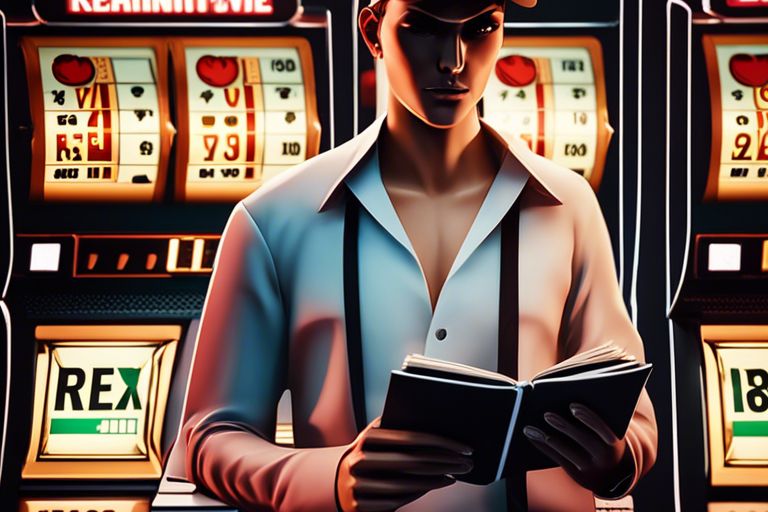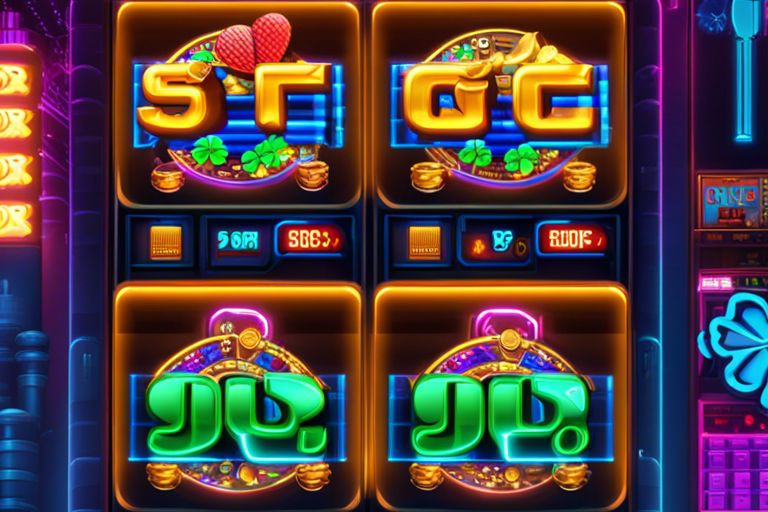Just when you thought that spinning those reels was all fun and games, you realize that the thrill can sometimes lead you down a rabbit hole of problematic gambling habits. In this guide, you’ll learn to spot the warning signs, understand why it matters, and discover how to take the reins back from those alluring slots. With a dash of humor and a sprinkle of empathy, we’ll walk you through the steps to identify your habits and seek help, so you can make informed choices about your gaming adventures.
Key Takeaways:
- Awareness of gambling habits is crucial: Recognizing the signs of problematic gambling, such as frequent losses or increasing time spent on slots, can help individuals take the first step towards seeking help.
- Seeking support is necessary: Engaging with professionals, support groups, or counseling can provide the necessary guidance and strategies to regain control over gambling behaviors.
- Setting boundaries and limitations: Implementing personal limits on time and spending can aid in managing gambling habits and prevent escalation into a more serious issue.
Identifying the Warning Signs
The journey towards recognizing problematic gambling habits begins with identifying the warning signs that may indicate you are treading into risky territory. It’s not uncommon for individuals engaging with slots to dismiss their behaviors as mere fun or harmless entertainment. However, it’s imperative to take a magnifying glass to your engagement as this can unveil underlying issues that may need your immediate attention. Being proactive in this self-assessment can vastly improve your odds of regaining control over your gambling habits and overall well-being.
Recognizing the Emotional Triggers
Any experienced slot player knows that emotions can wield a heavy hand in the choices you make—sometimes even more than logic. If you find yourself consistently drawn to the machines when you’re feeling anxious, lonely, or overwhelmed, this may be your emotional trigger waving a red flag. Let’s face it, putting a quarter in a slot machine can feel like a mini escape from a challenging day, but if you’re using this as your primary coping mechanism, it’s worth reevaluating your emotional toolkit.
Moreover, if winning—or the thrill of the spin—makes your heart race in a way that other daily joys fail to match, that euphoric feeling could signal trouble. Navigating emotions can often feel like walking a tightrope, but your awareness around these triggers could save you from tumbling into the pit of compulsive gambling.
Spotting the Behavioral Patterns
Any seasoned observer might tell you that behavioral patterns are often the telltale signs of larger issues lurking in the shadows. When you start noticing changes in how you approach slots—whether it’s an increase in frequency or spending—you might be entering problematic behavior. For some, it might manifest in the compulsive need to play even when you have no intention of winning, while for others, it could show up as neglecting responsibilities in favor of a late-night slot session. You’ll find that the clues are littered throughout your daily life, but spotting them requires a clear and honest gaze.
Plus, keeping a gripping tally on how often you play and your emotional states during these sessions can serve as a compass pointing you to the patterns that demand your attention. Are you playing to escape reality? Or do you find yourself thinking more about the next slot than your responsibilities? These questions can be critical in identifying your gambling behavior and how it relates to your daily routines.
The Role of Environment and Social Influences
Recognizing the environment and social influences in your gambling behavior can be just as imperative as pinpointing emotional triggers and behavioral patterns. Often, you may find that your surroundings—whether it’s the company you keep or the atmosphere of the venue—can heavily influence your gambling habits. If your friends cheer you on when you hit the casino, you might feel more compelled to join in, even if your instincts are warning you to step back. The thrill can be contagious, but so can the habit.
Understanding the impact of friends, family, or even coworkers on your gambling choices can shed light on how much control you truly have over your decisions. Are they encouraging you to keep playing in times of loss simply because it’s an enjoyable group activity? The clarity gained from assessing these social dynamics is crucial for developing a healthier relationship with gambling, as well as fostering mindfulness around your choices.
The Consequences of Problematic Gambling
Any conversation about gambling would be incomplete without addressing the darker side of this pastime—the potential consequences that can ripple through your life when habits cross the line into problematic gambling. Recognizing these consequences is vital, as it can guide you toward seeking help and, ultimately, regaining control. While spinning those reels might seem like harmless fun, it’s vital to acknowledge that they can lead to a series of catastrophic outcomes that affect not only you but also those around you.
Financial Fallout: Debts and Bankruptcy
Fallout from problematic gambling often manifests in the form of financial devastation. You might start off with just a casual game at the slots, thinking it’s a harmless way to unwind, but before you know it, you’re borrowing from friends and family, tapping into credit lines, or even draining your bank account in the pursuit of that elusive win. Those initial small losses can balloon into massive debts, leaving you in a financial fog that seems impossible to escape. When bills go unpaid and the constant stress over money builds, you may find yourself at a tipping point—you could face bankruptcy, which can haunt your credit history for years and make obtaining loans or even renting an apartment a challenge.
Unfortunately, this financial disarray tends to trap you in a vicious cycle where you chase losses, convinced that another go at the slots will help you recoup. As you dig deeper to ‘win it all back,’ the costs keep accumulating, creating a whirlwind of stress and anxiety. It’s important to realize that while gambling might promise instant gratification, the aftermath can be a long, bleak road filled with mounting bills and sleepless nights.
Strained Relationships: Family and Friends
Consequences of problematic gambling extend well beyond your bank account; they take a significant toll on your relationships, too. Those close to you, whether family or friends, might initially be supportive, but constant borrowing or inexplicable absences can quickly lead to suspicion and disappointment. As tensions mount, you may find that your loved ones grow frustrated with your gambling habits, leading to arguments and even estrangement. The trust that once anchored your relationships can suffer irreparable damage when they become collateral damage in your pursuit of a thrill.
Friends and family may feel helpless as they witness your struggle, and their inability to help can cause them to distance themselves from you. It’s a cruel irony: while you may have begun gambling for fun, the compulsion to keep playing can lead to isolation just at the moment when companionship and support would be most beneficial. Recognizing this worsening dynamic is crucial, as it can urge you to reconsider your gambling habits before it’s too late.
Mental Health Impacts: Anxiety and Depression
Health is yet another area where the consequences of problematic gambling can rear their ugly head. The thrill of winning can quickly turn into anxiety and despair when losses mount, pushing you into a psychological corner. You might find yourself constantly on edge, worrying not just about your finances but also about how to maintain appearances with those around you. The stress of hiding your gambling habits and the shame that accompanies it can snowball into serious mental health issues, including anxiety and depression.
To regain control over your life, it’s vital to acknowledge that these mental health ramifications are just as real as the financial issues. The emotional toll can become overwhelming—leading to sleepless nights, constant worry, and a marked decline in your overall wellbeing. Seeking help isn’t just about addressing your gambling; it’s about reclaiming your mental health, as well. When you combine practical financial steps with professional mental health support, you pave the way toward a healthier, more balanced life that minimizes the impacts of problematic gambling.
Breaking the Cycle of Addiction
Now, breaking free from the grips of problematic gambling can often feel like attempting to steer a ship through a storm without a compass. But here’s the truth: the first and most crucial step is admitting that you have a problem. It’s easy to dismiss that nagging voice in your head, to tell yourself that this time will be different or that you can control your spending. The reality is, if you’re reading this, you might already feel that familiar twinge of anxiety mixed with a flicker of hope. Acknowledging that your gambling habits have become problematic is not a sign of weakness; in fact, it’s an act of bravery that paves the way for genuine change.
Admitting the Problem: The First Step
Problem gambling can sneak up on you, like an unexpected pop-up ad while you’re online shopping for something innocent—only this time, the stakes are much higher. You might find yourself rationalizing your behavior or comparing it to others’ experiences, but deep down, you know something isn’t right. It’s necessary to confront these feelings honestly. By deciding to face the truth, you are already making progress in your journey to reclaim control over your life. Recall, this is about you and your well-being. Owning your situation is the first step toward breaking the cycle of addiction.
Seeking Professional Help: Counseling and Therapy
One of the most effective ways to address your gambling issues is to seek professional help. Therapists and counselors who specialize in gambling addiction can provide you with the tools and insights necessary for recovery. They create a safe space for you to examine into the underlying issues that may be fueling your addiction, be it loneliness, anxiety, or a need for excitement. Therapy can uncover patterns of thought and behavior that contribute to your gambling, guiding you toward healthier coping mechanisms. The idea of opening up to a stranger can be daunting, but it is often liberating to share your burdens and explore new paths under expert guidance.
With the support of a trained professional, you can gain fresh perspectives on your habits. They can help you develop strategies to deal with triggers and stressful situations that typically lead to gambling. Additionally, they might introduce you to cognitive-behavioral techniques that promote mindfulness and emotional regulation. This tailored approach can empower you to challenge harmful beliefs about gambling and equip you with new skills for dealing with life’s uncertainties.
Support Groups: Sharing Experiences and Strategies
Admitting that you need help is a giant leap, but the journey doesn’t end there. Participating in support groups can be a lifesaver in your battle against gambling addiction. Here, you’ll find a group of individuals who understand your struggles, offering camaraderie and insights that a therapist may not provide alone. Sharing your experiences and listening to others can reinforce the commonality of your journey. It’s comforting to realize you’re not alone and that collective wisdom can fast-track your recovery.
Plus, these groups often provide practical strategies that have worked for others in similar situations. You can pick up valuable tips on how to handle cravings, avoid high-risk environments, and strengthen your resolve. With the shared support, encouragement, and heartfelt stories, you’ll feel a sense of belonging that can fill the void that gambling used to occupy. So, gather your courage and find a support group — it’s time to turn your journey around with allies by your side.
Strategies for Regaining Control
Unlike the whimsical notion that you can just waltz back into the casino and reclaim your control as if it’s a lost scarf, regaining balance in your relationship with slots requires a multi-faceted approach. Let’s face it: Slots can be utterly entrancing, with their flashing lights and the irresistible clatter of coins (or their digital equivalent) tumbling to your feet. However, recognizing that these shiny distractions are playing a significant role in your habitual play might just be the first step in taking back the reins of your life.
Setting Boundaries: Limiting Access to Slots
Slots don’t wait for a formal invitation; they are always there, lurking in the corners of your phone or local gambling establishments. How do you stop the slots from being an omnipresent temptation? The answer lies in setting firm boundaries for yourself. This could mean limiting your time spent playing, using blocking apps to restrict your access to gambling sites, or even avoiding places where slots are prevalent. Think of it as decluttering your brain; if it’s out of sight, it’s often out of mind.
In creating a physical and mental distance from slots, you empower yourself to reconsider what you’re doing and why. Have a specific scheduled time or a limit on how much you can spend if you do venture out. Developing your willpower muscle can give you the opportunity to enjoy the thrill of gaming without risking your well-being or financial stability.
Finding Alternative Coping Mechanisms: Healthy Habits
For many, the lure of slots often emerges in moments of stress or boredom as a form of escapism. Instead of defaulting to your go-to machine, consider what other activities could provide you with the distraction or relaxation you seek. You could head out for a brisk walk, engage in reading, or even explore a hobby you’ve long since shoved aside in favor of spinning wheels. By trying out new habits, you may discover there are plenty of ways to soothe your mind that don’t revolve around the constant jingling of coins.
Accessing various healthy habits doesn’t just distract you; they can substantially improve your overall well-being. Perhaps you try taking a painting class or signing up for a yoga session. Remember those once-cherished pastimes that had set your heart aflutter? It might be time to revisit them. Providing your mind with rejuvenating activities can diminish the temptation to fall back into old, harmful routines.
Rebuilding Self-Esteem: Focusing on Strengths
Setting aside time to reflect on your strengths can be one of the most effective tools in rebuilding your self-esteem. Think about what you excel at—be it mental puzzles, a good sense of humor, or kindness to those in your life. It’s important to remind yourself that your worth isn’t tied to gambling victories or losses but centered around the invaluable qualities that make you unique. Cultivating this sense of self can shift your focus away from impulsive choices and steer you towards healthier, fulfilling endeavors.
Habits built on understanding and appreciating your strengths can act as a powerful safeguard against the pull of slots. When you recognize that your value doesn’t hinge on luck or a spinning wheel, you fortify your confidence and self-belief. Perhaps even jotting down achievements—no matter how small—may illuminate just how multifaceted and capable you truly are. You might just find it easier to walk away from slots when you have a flourishing, vibrant sense of self to cherish instead.

Managing Triggers and Cravings
Your journey towards regaining control over your gambling habits may be fraught with unexpected triggers and cravings that pop up at the most inconvenient times. These triggers can consume your thoughts, often leading you back to the gleaming allure of the slots. Recognizing these moments for what they are is paramount. Acknowledging that they exist—and that they can be managed—creates the first step on your path to healthier habits. With every rush of craving, you are at a fork in the road: one direction steers you toward the machine, while the other leads you towards constructive choices that foster resilience.
Identifying High-Risk Situations
With your newly honed awareness, the next act is to identify high-risk situations that may induce cravings. These scenarios could range from a casual stroll past a casino to a friendly social gathering where gambling is the featured entertainment. It’s critical to note the environments and emotional states that encourage you to gamble. If you find yourself falling into the familiar patterns of temptation, consider this a call to action. Assessing these situations will help you develop a strategy to navigate them without succumbing to the urge to play.
Developing Coping Skills: Mindfulness and Distractions
On your quest to manage cravings, practicing mindfulness can serve as a sturdy anchor. Mindfulness exercises, such as focused breathing or guided meditation, allow you to gain clarity amidst the chaos your cravings create. Additionally, having a toolbox of distractions—activities that engage your mind or body—can pull you away from the casino’s siren call. Whether it’s reading, exercising, or even indulging in a favorite hobby, the goal is to cultivate a diverse repertoire of alternatives that allow you to redirect your focus.
Distractions can be particularly effective in those moments when the urge seems unbearable. Imagine experiencing a sudden surge of yearning for those spinning reels, but instead of succumbing, you investigate a podcast that makes you laugh or a puzzle that needs solving. By keeping your mind engaged and your hands busy, you can successfully weather the storm until the cravings pass, which they inevitably will. Each passing moment of resistance is a small victory on your journey to lasting change.
Building a Support Network: Friends and Family
Developing a support network composed of friends and family can be an vital buffer against your triggers and cravings. Surrounding yourself with those who understand your struggles fosters an environment of accountability and empathy. Sharing your experiences with trusted loved ones not only reduces feelings of isolation but also creates an open dialogue about your challenges and progress. When cravings strike, having someone you can lean on can be a game-changer in maintaining your resolve.
Another key aspect of nurturing this network is establishing some ground rules. For instance, you might ask friends to refrain from discussing gambling in your presence or to invite you to alternative activities that steer clear of gaming establishments. This proactive approach can help avoid situations that may cause you to falter, ensuring that your support system remains a positive influence in your life. Bear in mind, you aren’t alone on this journey; your support network has your back, and together, you are stronger.
Rebuilding Your Life
To regain control over your life after grappling with problematic gambling habits, it’s crucial to initiate on a journey of rebuilding. The process often involves addressing various aspects of your life, including relationships, finances, and personal fulfillment. Each step you take towards healing not only helps repair the damage done but can provide a renewed sense of purpose. Do not forget, you are not alone in this journey—many have tread this path and emerged stronger on the other side.
Repairing Relationships: Apologies and Forgiveness
The road to rebuilding your life doesn’t come without its challenges, especially when it comes to mending strained relationships. Relationships may have suffered due to broken promises or financial stresses tied to your gambling habits. You might find it helpful to start with sincere apologies. A heartfelt acknowledgment of your actions can serve as the first step in a healing process that emphasizes honesty and openness. Whether it’s a family member, friend, or partner, take the time to express your regret and your commitment to change.
The act of asking for forgiveness is often as beneficial for you as it is for them. This process can feel daunting, like walking through a haunted house where every creak and whisper makes you want to run. But remember, every sound you hear is merely a reminder of the past. Trust may take time to rebuild, but patience can bridge the gap created by your gambling habits, allowing your cherished relationships to thrive once again.
Creating a Budget: Financial Recovery
Rebuilding your financial life after the repercussions of gambling can seem as overwhelming as a popping confetti balloon, but it’s crucial for long-term recovery. Start by crafting a budget that not only tracks your expenses but also helps prioritize necessities over luxuries. This is not just about counting coins; it’s about reshaping your financial landscape to create a safety net for yourself. Setting financial goals, even small ones, will help you establish a sense of control and security in your life, allowing you to focus less on past mistakes and more on a sustainable future.
It’s helpful to enlist the guidance of a financial professional or a trusted friend when creating your budget. They can help you navigate any tricky financial waters. Consider utilizing budgeting apps or tools that can help you visually track your progress. Do not forget, every small success is a step toward regaining control and building a stable financial future, and each time you make a responsible decision, you reinforce your commitment to recovery.
Finding Purpose: New Hobbies and Interests
Apologies may mend relationships, while budgeting will steer you back to financial stability; however, finding a sense of purpose lies in discovering new hobbies and interests that ignite joy and fulfillment. This can serve as your personal antidote to the lures of gambling—a chance to channel your energy into activities that nourish your soul rather than draining your resources. Whether it’s picking up painting, joining a book club, or volunteering, these endeavors can create a vibrant tapestry of experiences that empower you and refresh your spirit.
A crucial part of this journey is understanding that finding purpose is not just an end goal, but an ongoing quest. Exploring new avenues can lead to personal growth, inspire joy, and help you form new, healthy habits that replace the thrill once associated with gambling. Dive in, experiment, and don’t be afraid to try something that makes your heart sing—after all, life is a parade of experiences waiting for you to participate.
To Wrap Up
As a reminder, recognizing problematic gambling habits is the first step to regaining control over your life and your bankroll. Slots can feel like a dazzling escape, but it’s important to know when the music fades, and reality crashes in like the disco ball gone rogue at a wedding party. If you’ve spotted a few telltale signs — such as sneaking away during family gatherings just to “check the score,” or draining your savings in the name of chance — it might be time to tap your brakes and reconsider your relationship with luck. You deserve to lead a life bursting with joy, not just with the highs of a lucky spin, but with the genuine connections and experiences that make life rich and fulfilling.
Seeking help isn’t a sign of weakness; it’s an act of courage that showcases your commitment to rediscovering your spark without the distractions of bells and whistles. Whether it’s reaching out to friends, support groups, or professionals, remember that you’re not alone in this dance. Just as the best dancers know when to take a step back and reassess their moves, you too can learn to navigate this path more gracefully. Embrace the process, and you may find that life off the slots can be far more rewarding and meaningful than any jackpot ever could be.
FAQ
Q: What are some signs that I may have problematic gambling habits while playing slots?
A: There are several signs that may indicate problematic gambling habits, including: frequently lying about your gambling activities, spending more money than you originally intended, feeling anxious or irritable when unable to gamble, chasing losses by continuously playing in hopes of recouping lost money, and experiencing neglect in responsibilities at work, home, or in relationships due to gambling. If you notice these behaviors in yourself, it may be time to seek help.
Q: How can I seek help if I recognize that my gambling habits are out of control?
A: If you recognize that your gambling habits are problematic, there are several resources available to help. You can begin by reaching out to support groups such as Gamblers Anonymous (GA) where you can speak with others who have faced similar challenges. Additionally, consider contacting professionals who specialize in addiction counseling and therapy. Many hotlines and online resources provide confidential support and can guide you toward treatment options.
Q: What steps can I take to regain control over my gambling habits?
A: Regaining control over your gambling habits may involve several proactive steps. First, set clear limits on both the time and money you spend on gambling. Second, self-exclusion programs offered by casinos or online platforms can help you take a break from gambling entirely. Third, engage in alternative activities that provide fulfillment and joy outside of gambling, such as hobbies or exercise. Lastly, consider seeking emotional support from friends, family, or professionals to navigate your recovery journey.
Q: Are there specific resources for individuals struggling with slot machine gambling?
A: Yes, there are many resources specifically targeting individuals struggling with slot machine gambling. Many gambling addiction websites provide information and resources aimed at slot players. Organizations like the National Council on Problem Gambling (NCPG) have dedicated materials and programs that focus on various forms of gambling, including slots. Additionally, many casinos offer support programs and self-help resources for those affected by slot machine gambling.
Q: Can problematic gambling habits impact my mental health and relationships?
A: Absolutely. Problematic gambling can lead to significant mental health issues, including anxiety, depression, and stress, as the constant desire to gamble can create emotional turmoil. Relationships with family and friends may suffer due to secrecy, financial strain, and the prioritization of gambling over personal connections. Addressing problematic gambling habits is crucial not only for financial stability but also for maintaining healthy mental well-being and fostering positive relationships.






